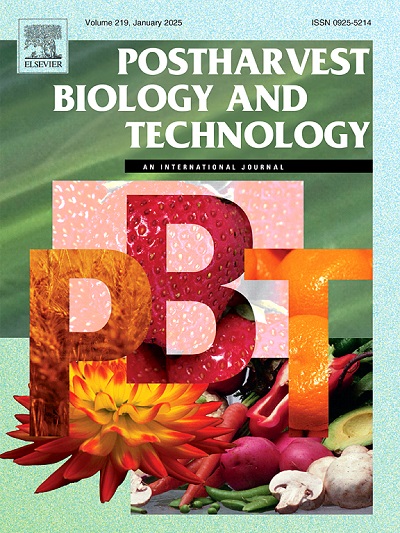转录组学与代谢组学结合分析采后 "新梨 7 号 "梨果木质素通路冷诱导的皮孔紊乱
IF 6.4
1区 农林科学
Q1 AGRONOMY
引用次数: 0
摘要
梨果在冷藏过程中果皮经常会出现严重的皮孔紊乱,影响其外观和商业价值。用乙烯或 1-甲基环丙烯处理梨(Pyrus bretschneideri Rehder cv. Xinli No.7)果实,在 0 °C 下贮藏 28 周(空气处理作为对照)。观察结果表明,皮孔扩大并突出,导致梨在贮藏过程中表面更粗糙。此外,皮孔紊乱的发生与木质素的生物合成密切相关。RNA-seq和加权基因共相关网络分析结果表明,木质素生物合成、植物激素转导和皮孔紊乱发生模式的基因表达之间存在正相关关系。结果表明,木质素生物合成的增加是通过转录因子和参与乙烯、茉莉酸等植物激素转导的基因上调实现的。这些结果为了解冷胁迫下'新梨 7 号'梨果皮层紊乱的机理提供了新的视角,并为贮藏期间果实品质的保持提供了理论依据。本文章由计算机程序翻译,如有差异,请以英文原文为准。
Transcriptomics integrated with metabolomics analysis of cold-induced lenticel disorder via the lignin pathway upon postharvest ‘Xinli No.7’ pear fruit
Pear fruit often suffer severe lenticel disorder in the peel during cold storage, affecting their appearance and commercial value. Pear (Pyrus bretschneideri Rehder cv. Xinli No.7) fruit were treated with ethylene or 1-methylcyclopropene and stored at 0 °C for 28 weeks (air treatment was used as a control). Observations revealed that the lenticels expanded and protruded, resulting rougher pear surface during storage. Furthermore, the occurrence of lenticel disorder was closely related to the lignin biosynthesis. Results from RNA-seq and weighted gene co-correlation network analysis showed a positive relationship among gene expression of lignin biosynthesis, plant hormone transduction, and the occurrence pattern of lenticel disorder. The results showed an increase in lignin biosynthesis through the upregulation of transcription factors and genes involved in the transduction of plant hormones, including ethylene and jasmonic acid. These results provide new insights into the mechanisms of lenticle disorder in ‘Xinli No.7’ pears under cold stress, and offer a theoretical basis for the maintenance of fruit quality during storage.
求助全文
通过发布文献求助,成功后即可免费获取论文全文。
去求助
来源期刊

Postharvest Biology and Technology
农林科学-农艺学
CiteScore
12.00
自引率
11.40%
发文量
309
审稿时长
38 days
期刊介绍:
The journal is devoted exclusively to the publication of original papers, review articles and frontiers articles on biological and technological postharvest research. This includes the areas of postharvest storage, treatments and underpinning mechanisms, quality evaluation, packaging, handling and distribution of fresh horticultural crops including fruit, vegetables, flowers and nuts, but excluding grains, seeds and forages.
Papers reporting novel insights from fundamental and interdisciplinary research will be particularly encouraged. These disciplines include systems biology, bioinformatics, entomology, plant physiology, plant pathology, (bio)chemistry, engineering, modelling, and technologies for nondestructive testing.
Manuscripts on fresh food crops that will be further processed after postharvest storage, or on food processes beyond refrigeration, packaging and minimal processing will not be considered.
 求助内容:
求助内容: 应助结果提醒方式:
应助结果提醒方式:


